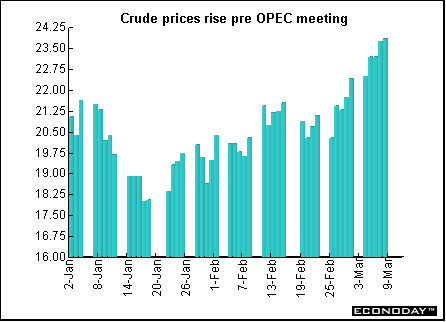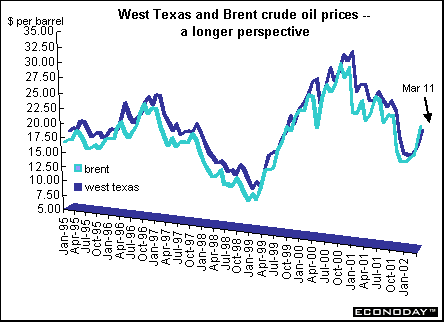The price of crude has been rising on both the NYMEX in New York and the International Petroleum Exchange
in London. The Organization of Petroleum Exporting Countries does meet on Friday but it's expected to leave
quotas unchanged. Other factors, however, are affecting prices:
Middle East political situation
Non-OPEC members compliance with OPEC quotas
Economic growth
Middle East political situation makes traders uneasy
Uncertainty is high in the Middle East. Market players are worried about the possible escalation of hostilities
with Iraq, especially after it said that it would bar United Nations arms inspectors. This raised concerns that the
United States might use military force against the Persian Gulf producer to force compliance with UN rules.
Iraq's refusal to allow inspectors to return after a three-year absence coincides with U.S. Vice President Dick
Cheney's trip to Europe and the Middle East to seek support for the war on terror. An attack would threaten
Persian Gulf shipping and halt exports from Iraq, which pumps about 3 percent of world supplies. Analysts say
that a war premium of about $3 is currently built into the price.'

A changing landscape - paying attention to the competition
OPEC (members are Saudi Arabia, Iraq, United Arab Emirates, Kuwait, Iran, Qatar, Nigeria, Libya, Algeria,
Indonesia and Venezuela) exacerbated the last price climb two years ago by limiting supplies. Crude prices
rose from a low of $10.83 in December 1998 to a high of $36.13 in November 2000. OPEC, despite its
diminished role in setting prices, is still trying to limit supplies, this time to prevent prices from falling
precipitously in a period of weak demand. In their production calculations, OPEC must now include non-
members with ample resources. At the end of 2001, OPEC delayed cutting production while trying to get non-
OPEC producers Mexico, Norway, Oman, Angola and especially Russia to acquiesce to its demands to cut
supply. And with another quarterly OPEC meeting on Friday, members say once again that they will not cut
production unless others outside OPEC do also. It is well known that the quotas are generally ignored by OPEC
members, especially in a time of falling revenues. However, with economic growth beginning to emerge,
concern is that OPEC might nip the recovery in the bud by raising prices by more than the market can bear.
Weak demand created the excess but users could face a supply crunch as growth resumes.

Russia has become a potent force in the crude oil market. Currently they are vying with Saudi Arabia to be the
largest oil producer and have sizeable untapped reserves as well. It is only with Russia's cooperation now that
OPEC can hope to control supplies - and prices.
Russia depends on oil and gas exports for 40 percent of its revenues. Last week the World Bank said that even
if world oil prices drop below $13 a barrel, Russian gross domestic product would still grow by 1.6 percent in
2002. Russia recently rebuffed an OPEC request to extend its promise to reduce oil supplies, signaling that
output may rise even as demand slows in the spring. Russia said that it would decide on the matter later this
month. Oil prices have surged 23 percent to almost $22 a barrel since November after Russia and rival nations
agreed to help OPEC limit supply. Increasing oil supplies from Russia would come as the arrival of spring in the
Northern Hemisphere sends oil consumption to its lowest point of the year. Last year, Russia took market share
by increasing oil output even as OPEC agreed to lower its quotas to the lowest level since the Gulf War. Most
of the other non-OPEC countries that also agreed to restrict exports for the first quarter, such as Norway and
Angola, have already agreed in principle to continue the restrictions. That leaves Russia as the major variable
in world oil supply.
Economic growth
Economic growth, especially in the industrialized world, has always had an impact on the delicate world oil
supply/demand balance. Critical to OPEC's assessment of production quotas now is the difficult estimation of
how fast world economies will recover from recession. And reading turning points is always a challenge! A
critical factor that could lead to higher oil prices is that a growing U.S. economy will strengthen demand for
petroleum products. OPEC has pushed through output cuts to bolster the price of crude oil and is pushing to
extend them. Its current output quota is at its lowest level since March 1991. Sticking to current output limits
threatens economic revival not just here but globally. The unusually warm weather in the United States has
fattened inventories because of reduced demand for heating fuel. But with growth picking up here and in
Europe, these supplies will be rapidly drawn down as the summer driving season approaches and refinery
production levels rise.
OPEC doesn't want to be charged with destroying incipient world growth by raising prices, but at the same time
it must provide needed income to its members. Control over production has always been a problem as
members are notorious for overshooting their quotas. Now non-member compliance is also a factor. OPEC
must do a balancing act between both as it faces a changed supply scenario and less control over it than in its
heyday of the 1970s and 1980s.
Underlying the oil supply problem has been the lack of incentives to develop alternatives to fossil fuels. But
higher oil prices make alternatives more attractive to produce. Similarly, there is a lack of incentive to conserve
as well. When high oil prices occur in an unprecedented period of high income accumulation, prices have less
impact on demand.
Investors are affected by oil prices both on a personal consumption basis and on their investments. Personal
costs for gasoline and home heating fuel are obvious. The return on their investments is affected as rising
energy costs cut into corporate profits. This is especially true now as companies fight to regain profits lost in
the recent recession.
Bottom Line
OPEC doesn't want to be charged with destroying incipient world growth by raising prices, but at the same time
it must provide needed income to its members. Control over production has always been a problem as
members are notorious for overshooting their quotas. Now non-member compliance is also a factor. OPEC
must do a balancing act between both as it faces a changed supply scenario and less control over it than in its
heyday of the 1970s and 1980s.
Underlying the oil supply problem has been the lack of incentives to develop alternatives to fossil fuels. But
higher oil prices make alternatives more attractive to produce. Similarly, there is a lack of incentive to conserve
as well. When high oil prices occur in an unprecedented period of high income accumulation, prices have less
impact on demand.
Investors are affected by oil prices both on a personal consumption basis and on their investments. Personal
costs for gasoline and home heating fuel are obvious. The return on their investments is affected as rising
energy costs cut into corporate profits. This is especially true now as companies fight to regain profits lost in
the recent recession.
Anne D. Picker, International Economist, Econoday
| 